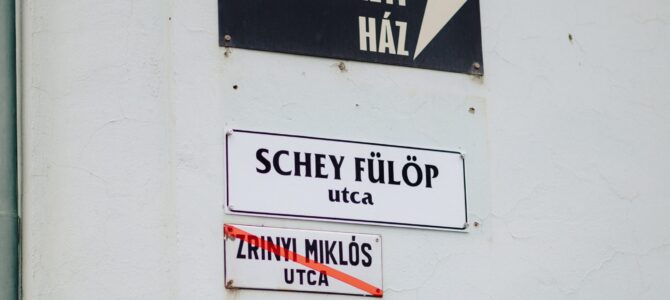Street in Kőszeg Gets Back Historic Name
Hungary Today, May 3, 2023
When the name of a public space in a municipality changes, it is usually associated with a political change. Perhaps the most striking example of this was when, after the fall of Communism, the names of public spaces given during the Communist period were changed en masse for ideological reasons. In the western Hungarian city of Kőszeg, the former Zrínyi Miklós Street was renamed Schey Fülöp Street on Tuesday, but the reason for the name change is different.
Fülöp Schey, the former patron of the town, the builder of the synagogue and a prominent figure of the local bourgeoisie, was commemorated in Kőszeg yesterday. Fülöp Schey’s descendants living abroad, members of the Schey-Ephrussi-de Waal family, also took part in the commemoration day organized jointly by the Kőszeg Municipality and the Institute of Advanced Studies Kőszeg (iASK; Felsőbbfokú Tanulmányok Intézete).
Fülöp Schey was born in Kőszeg in 1798. His family once came to western Hungary from Moravia and lived in Lakompak (aka Lackenbach, Austria) on the Esterházy estate. He married at the age of 18, his wife was Franciska, but they had no children. From 1823 he ran his own business and in 1831 paid taxes to the town of Kőszeg as a 1st class merchant. He had good business relations with the Esterházy, Batthyány and Erdődy families.
In the beginning, Fülöp Schey worked for the Wertheimstein banking house in Vienna. Later he made a considerable fortune as an independent wholesaler. In 1844 he was one of the founding members of the Kőszeg Savings Bank, of which he was vice president and later director.
His loyalty to the Habsburg court increased his fortune considerably. During the revolution of 1848 he stopped his business activities in the city but his fortune was further increased by the military transports of 1848-49. During the revolt and the struggle for freedom, he remained loyal to the imperial court but also bore a considerable part of the enormous war burdens imposed on Kőszeg.
His personal fortune enabled him to allocate considerable sums to charitable causes. He financed, among other things, the construction of the Kőszeg Municipal Supply House and the synagogue. In 1854, the Kőszeg House of Representatives presented him with a certificate of thanks for his help to the local poor. In 1868 he contributed to the establishment of a kindergarten, the first in Hungary, named Elisabethinum in honor of Queen Elisabeth, where children were admitted regardless of their denomination.
In 1859, Schey was elevated to the Austrian nobility by Emperor Franz Joseph. He was the first Jew to receive this honor, bearing the title Philipp Schey von Koromla.
From London came Kathy Henderson, a member of the Shey family, whose book, “My Disappearing Uncle, Europe, War and the Stories of a Scattered Family,” was launched at iASK on Tuesday morning as a prelude to Memorial Day. With the book, a mixture of memoir, detective work and political history, the author wanted to use her family history to show “how the culture of competitive victimhood in family stories is disappearing and being replaced by adventure.”
In the afternoon, the program continued with the street naming ceremony. “The street, formerly called Tyúk Street, was named after Fülöp Schey in 1896 on the occasion of the Millennium celebrations, whose memory remained alive among the population long after his death. … Between 1945 and 1948 the street was renamed Rákóczi Ferenc Street, and since 1956 it has been called Zrínyi Miklós Street,” the Kőszeg Municipal Archives wrote in an earlier statement.
In his speech at the inauguration of the street sign, mayor Béla Básthy said: “Kőszeg has returned to the main street of its history.” He recalled that the ghetto was established in this street at number 8, from where one of the smallest Jewish communities in the country with its own synagogue, a little more than 100 people, were deported, and only 16 of them survived the Holocaust.
Full story here.


